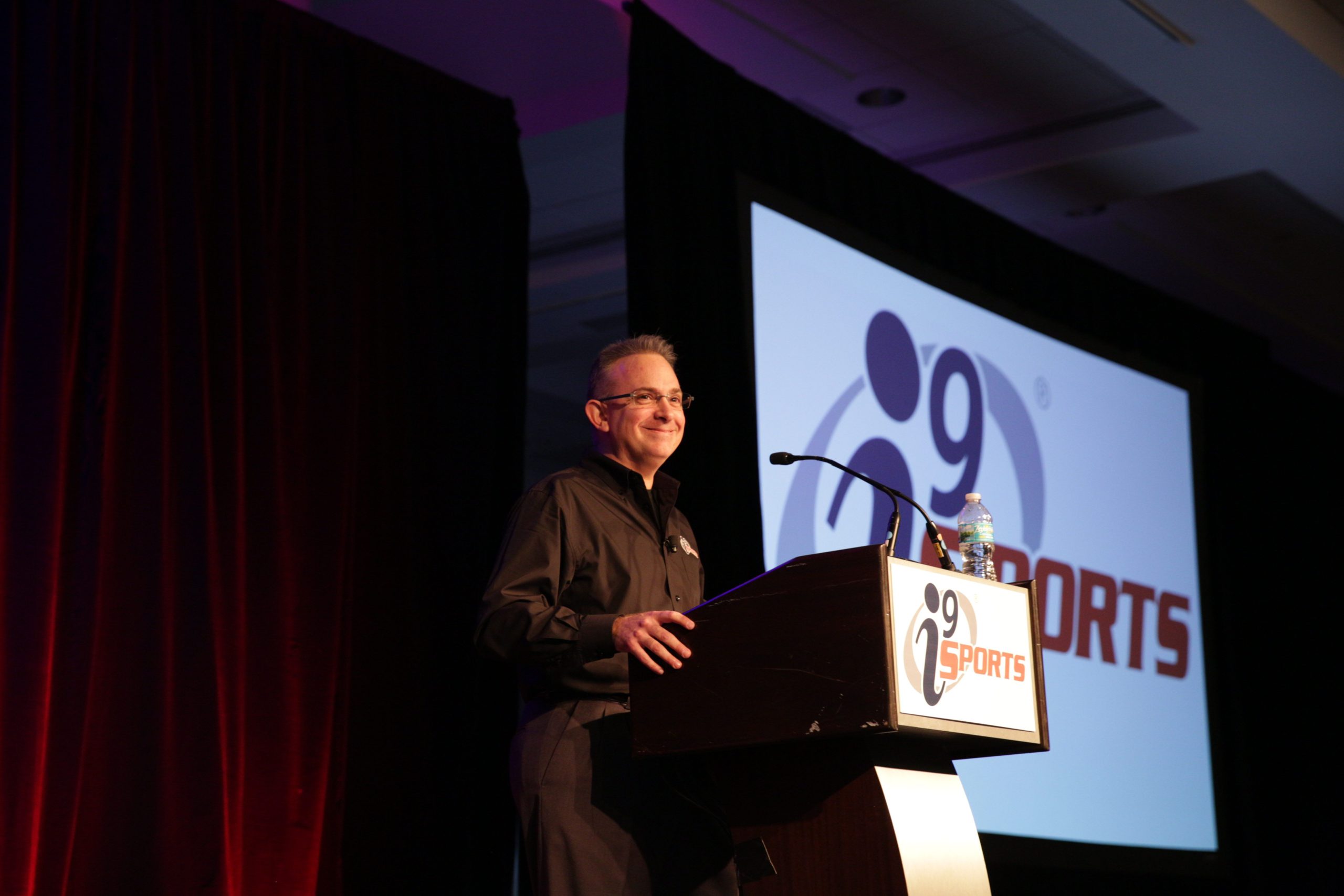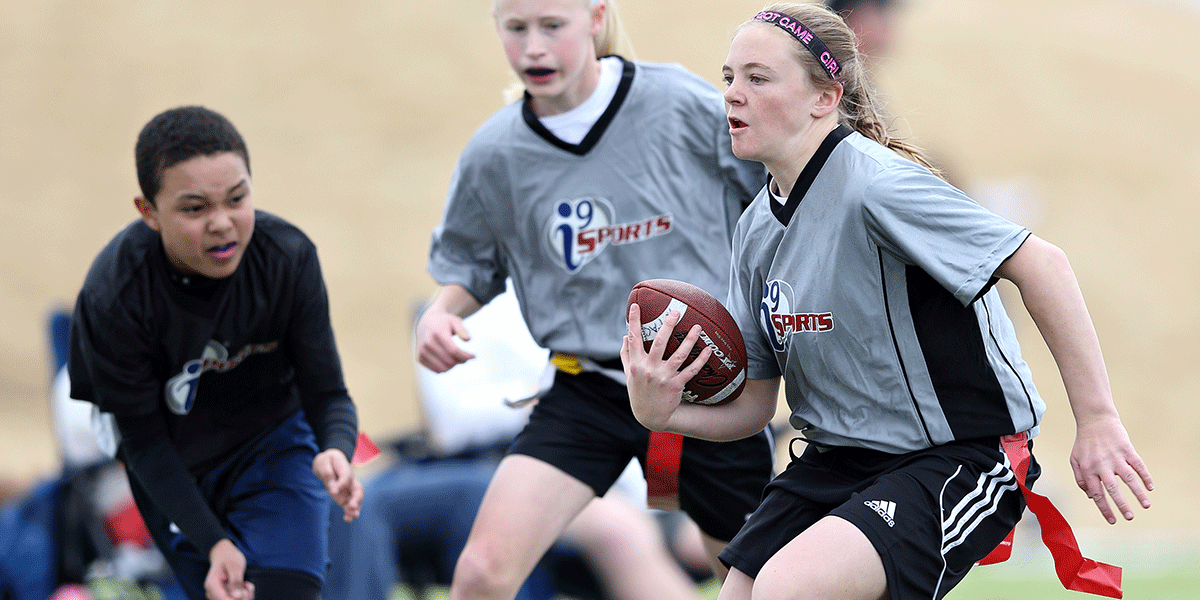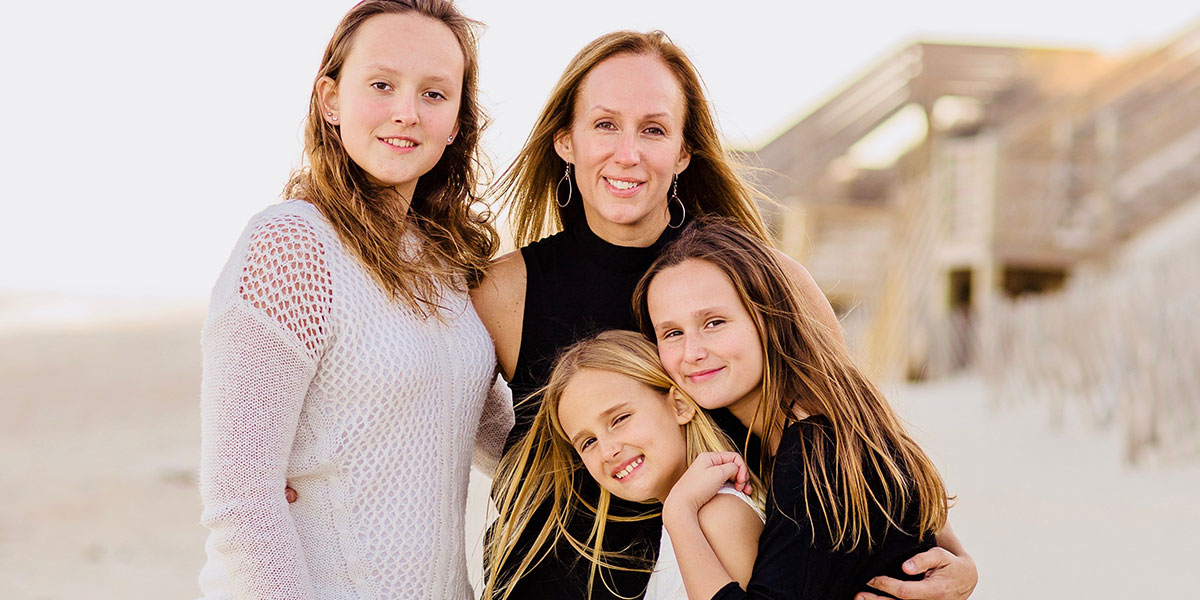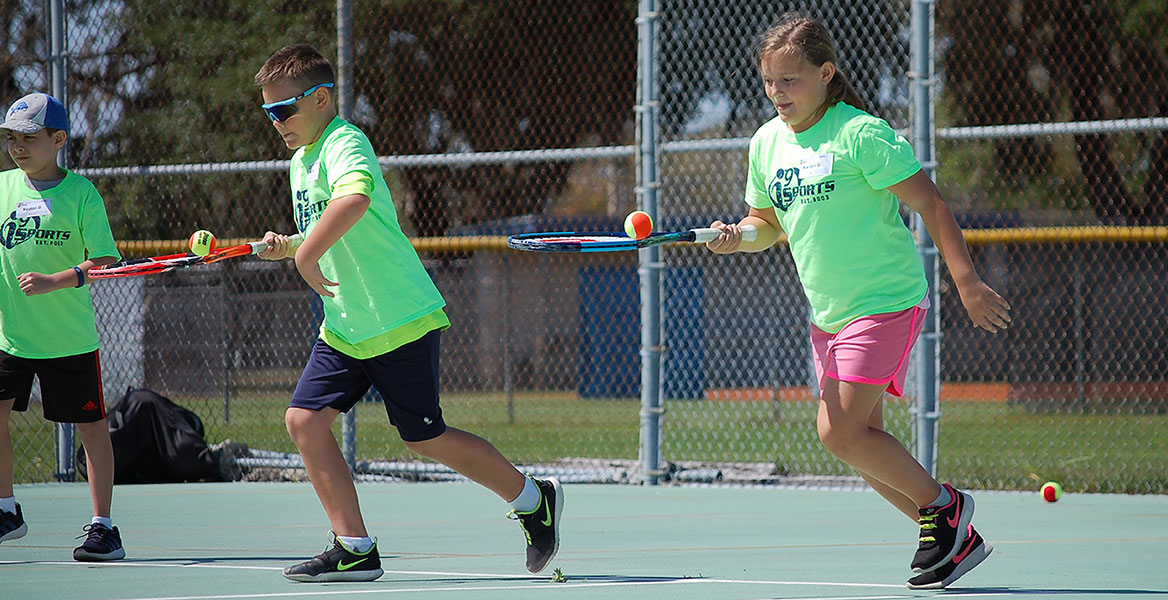i9 Sports founder Frank Fiume releases new book, ‘Running With My Head Down,’ that addresses the highs and lows of the entrepreneurial journey

Frank Fiume does not come from a family of entrepreneurs. He was not encouraged by his father when he left a lucrative (but unfulfilling) career to start his first business, an adult softball league called ABA Sports. And even when that grew to 900 teams very quickly and he sold it so he could start i9 Sports, his father wasn’t sure it was such a good idea. “My dad thought I was being foolish by selling ABA Sports to go and franchise this unknown concept called i9 Sports. He thought it was an unnecessary risk and that I was ‘killing the golden goose’ by selling ABA to start i9.” Did that discourage him? Not so much. “It actually fueled me to succeed,” Fiume says.
In 2017, Fiume sold i9 Sports to LNC Partners, a private investment firm, but remains very much involved as both a minority shareholder and a member of the board of directors. Fiume has learned a lot of lessons during his entrepreneurial journey over the years, and he shares them in his first book, Running With My Head Down: An Entrepreneur’s Story of Passion, Perseverance, and Purpose, released Oct. 1. It’s available at Barnes & Noble and on Amazon. Fiume shares some of his stories and advice in this Q&A.
What compelled you to write this book?
So often, you see somebody that has achieved some sort of success in life, and as an outsider looking in, you really don’t know what it took for that person to achieve success. In many cases, people think, “Oh, well, this person had the advantages, whether they had money or they had contacts or they had the know-how, to achieve some level of success.”
So what really inspired me to write this is that I wanted to show people that, despite coming from a home of financial deprivation and not having the contacts, but by following my passion in life, through sports and through perseverance and ultimately having the hunger to succeed, it’s possible to not just achieve your goals but to be wildly successful beyond your wildest dreams.

And that was your background?
For me it was like a rags-to-riches story, not having the contacts, not having the money, not having the know-how, but having the hunger, and I think that’s so important for people to know. Having that hunger, that’s the common trait among the people I know that have been most successful. I wanted to write this book to show folks that no matter what, you can have these crazy ups and downs — and I’ve had many failures in my life, but despite those failures, you can still be successful. And the book shows those ups and downs, because success is not a straight line. It’s a zigzag.
Who did you write this book for?
The primary audience is entrepreneurs and aspiring entrepreneurs. There are people looking to get into business and they really don’t know what it takes, or they’re dealing with doubters and naysayers who give them all the reasons why they shouldn’t start a business. And I hope to be that guiding light to folks who are looking to start a business. In this book I show them how to navigate through the ups and downs of starting and running a successful business.
Do you come from a family of entrepreneurs or were you a trailblazer?
I’m the first person in my family to go to college, and one of only a few entrepreneurs on both sides of my family. I grew up in Queens, New York, and I was raised with the values that you should do well in school, but that you get the best job possible. You stay there for 30 years. You get the pension, the retirement, and it was all about security.
I was raised with the feeling that entrepreneurship, to be successful in business, was an anomaly. It was not for us; it was something for other people. I was not encouraged. In fact, I was discouraged to start a business. I was told that I was going to fail and I was told to stay in my medical sales job, which was a six-figure job, and play it safe, and that was what I was encouraged to do.
But then you started ABA Sports, and it grew really large fairly quickly. What role did that have in inspiring you to go on and start i9 Sports?
Oh my gosh, it gave me hope. So here’s what happened: In my medical sales job, I hate what I’m doing, and when I say hate, I mean I had no fulfillment whatsoever in being in medical sales despite making a six-figure income. So I start this softball league. It starts to grow and I’m working harder than ever in getting my softball league off the ground. That gave me hope that I can take what I achieved here and grow. Of course, most of the doubters and naysayers among my family and friends that said I could never start ABA Sports now weren’t necessarily doubting me about starting i9 Sports because I had achieved some level of success with ABA.
Though my dad, in particular, thought I was being foolish by selling ABA Sports, I think the more that I was doubted and the more I was told it would never work, the more it absolutely fueled me to succeed.
And with i9 Sports, you came up with what was at the time, and arguably still is, a pretty revolutionary concept in youth sports with the way it approaches sports instruction and competition. What was it about that particular niche in sports that appealed to you?
It goes back to my experience as an 11-year-old. I had a best friend who lived next door. He pitched in Little League while his dad coached, and his dad was one of those guys that would absolutely lose their minds, screaming and yelling and hollering at the kids, particularly his own son. When my best friend lost the championship game by walking in the winning run, he knew he was in for it. He ran off the field, hysterically crying, locked himself in the family car, and his dad went into the car and got in, and the screaming and yelling was so bad. When we got home that night, I remember, they were next door to me or adjacent to my backyard. His dad made him pitch for hours on end as a punishment for losing the game, and that absolutely resonated with me.
My parents weren’t like those crazy sports parents, but they encouraged me to play sports, but not to an unhealthy level. It was like I played at my own free will. I didn’t have anybody pushing me to play. That memory stuck with me and I always felt like if I ever did anything in sports, it would look nothing like this because I played for fun. Don’t get me wrong, I wanted to win. I’m a very competitive person, but I want to win in a healthy, competitive way, not at a win-at-all-costs way, and this guy was completely out of control.
At what point in your growth with ABA, your first company, did you know that you wanted to create this sport league franchise for youth?
In the late nineties, the NFL announced that they wanted to start offering flag football programs throughout the United States as an outreach program to spread the game of football. Now, by this time, I had already been running my adult men softball league, so I already knew how to run leagues. Here’s the thing, though. The NFL didn’t offer any training, support or direction whatsoever on how to run a league. It was nothing more than a vendor relationship where they offered the jerseys and equipment.
And I thought to myself, I know that the trend for youth sports is growing, and that there are inherent issues with tackle football and the risk of concussion. And I thought, this is a great opportunity for my wife and I to expand our adult softball program and venture into youth sports. I thought that’s where there was a great opportunity for growth, and also, I have much more passion for kids’ sports. You know, to see a kid score his first touchdown and seeing the parents cheering, and the grandparents, you feel an incredible amount of gratitude and it’s just so fulfilling.

What’s next in your career that you would care to share?
As the founder of i9 Sports, it will always be my baby, but the baby grew up. The company no longer needed me the way it used to. I’m still very much involved as not just a minority shareholder, but on the board of directors, and I’m still very closely involved with the management team.
But my next mission in life is to help entrepreneurs, aspiring and current entrepreneurs, with helping them start up, grow their companies and get fulfillment from what they do.
Is that the message you would you like people to take away from the book?
I think the big takeaway from the book is that I share through my own personal journey that my wife and I live by a mantra of living a life with no regrets. In other words, we never once looked back and said, we should’ve could’ve would’ve. We always made the decision to make a decision in our life that was okay. We got to live with no regrets, and that means sometimes making very difficult decisions, doing things that are scary or painful, but if it’s the right thing to do, then you do it even if you’re scared.
That’s a big aspect of the book because you’re going to see that throughout my book, this journey is this all highs and lows. We started succeeding right out of the gate, but then we made some mistakes and started having failure. But I take people on a journey. Starting a business, surviving, growing and then finally exiting, and I think it’s a beautiful story of showing people how to navigate all those stages of entrepreneurship.
As you have traveled through all these peaks and valleys, have you found a common big mistake that people make when they’re thinking of starting a business?
You cannot be afraid to make mistakes. The most successful companies make lots of mistakes, but here’s the difference between those companies that succeed and those that fail. The companies that succeed make lots of mistakes but they learn from them quickly and move on. I have seen fellow entrepreneurs that have made a mistake and they become suddenly paralyzed, and they can’t make another decision to grow their company because they’re so afraid of failing. You cannot be afraid of failing. The only way that you’re going to fail in business is if you stop changing, and you become paralyzed.
So make lots of mistakes, but learn from them fast. Those are the companies that survive and thrive. And the other thing is, a decision that you make out of fear is almost always the wrong decision. For example, a decision made under fear is playing it safe, which seems like really no decision at all, right? But you’re basically making a decision by not deciding.
You cannot make decisions out of fear, and you have to keep plowing ahead. Those would be the big things because ultimately, in entrepreneurship, the psychology of the owner is what drives the business. It’s also the chokehold of the business. It’s the psychology of the owner.
Do you consider yourself a naturally courageous person or do you struggle with the fear?
You know, you have to dance with the fear. You can’t let fear stop you, so I don’t think I’m extraordinary in terms of being fearless by any means. But I don’t let it get in the way. I don’t let it stop me. The thing that has made me different from maybe some fellow entrepreneurs, good or bad, is that I’ve been very fortunate in that I’m able to anticipate change before it happens, and I have found that some entrepreneurs who have done a really, really great job growing their company also anticipate change before it’s happening. Now, these changes could be changes in competition, changes in the economy, changes in culture, changes in technology, changes in our customers’ lives or what they want. So, I’ve been fortunate to anticipate, okay, if this is what I see is happening, it’s a trend. I want to jump ahead of it.
How much of that is instinct and how much of that is paying attention to what’s going on around you?
“People need to stop falling in love with their product, and fall in love with their customer.”
I think you have to be so in tune with what’s going on and look at it objectively. I don’t think that I have this intuitive nature where I can predict it. But I’m telling you, if you’re truly a student of your industry and you see what’s going on and you start connecting the dots, you can kind of tell where this company needs to go. Here’s the secret, though: The secret is you have to be able to remove yourself from what you do for a living. In other words, I could put myself in the eyes of the customer and I can go into an i9 Sports field and forget who I am in the company, forget what I do. I can truly experience it as a customer and figure out, here’s what’s going well, here’s what’s not going well, here’s a change that needs to be made. Sometimes people can’t get out of their own way and they fall in love with their product, and people need to stop falling in love with their product, and fall in love with their customer.
You have taken a lot of leadership courses with people like Tony Robbins. Do you see yourself teaching courses like that to others someday?
Yeah, Tony Robbins has been a huge influence in my life. This book marks the launch of the next phase in my life where I can share my experiences with others. I have had all this experience, and to me it would be a complete waste if I weren’t able to share it with other people and help them navigate their own business and learn how to get through some of these twists and turns. I’ll be doing some public speaking and possibly hosting a podcast radio show next year, but for now the book is my next mission to helping fellow entrepreneurs.
What’s the best piece of business advice you ever got?
Hire somebody that’s going to complement your weaknesses. The best decision I ever made for my company was hiring Brian Sanders as the COO/President, and the reason why is because Brian and I complement each other. I’m the zany entrepreneur coming up with these crazy big-picture ideas, and he’s this creative genius who’s fantastic at implementing systems and processes and leading people. That is the beauty of how he and I have been yin and yang together for many years. And also, Kim Armellino, my VP of Finance since 2001; Kim also totally complements my weaknesses, with her incredible intuition. In many ways she has been the heart and soul of the company from the very beginning.
So, hire to complement your weakness. Do not hire somebody with your same strengths. You would be just wasting your time and money, and you’re going to be yessing each other to death and not get anywhere.
What would you like your legacy to be?
I’d love my legacy to be that I found my purpose in life, which was to be fulfilled by using my enthusiasm and my creativity to inspire others. I know that i9 Sports is a major part of my legacy, and I’m proud and grateful for what this brand it’s become. To have positively impacted millions of kids lives’, provided financial freedom to hundreds of entrepreneurs, and helped create thousands of jobs is still mind-boggling to me. I think it’s going to take at least a few more years before it actually sinks in. i9 Sports is part of my DNA, and will always hold a special place in my heart.
Own an i9 Sports franchise
If you’re feeling inspired by “Running With My Head Down” and by founder Frank Fiume’s story and would like to learn more about owning an i9 Sports franchise, we’d love to hear from you. Fill out the form on this page to download our free franchise report. You can continue exploring the i9 Sports offering on our website.




